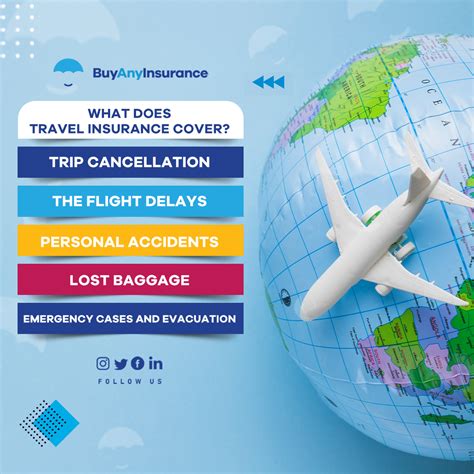Traveling
Travel Insurance Coverage Explained

Introduction to Travel Insurance
When planning a trip, whether it’s a short weekend getaway or a long, international voyage, there are many things to consider, from booking flights and hotels to planning activities and managing budgets. One crucial aspect that is often overlooked until the last minute is travel insurance. Travel insurance is designed to protect travelers against unforeseen circumstances that could affect their trip, such as medical emergencies, trip cancellations, or losses. Understanding what travel insurance covers and how it works is essential for any traveler looking to mitigate risks associated with traveling.
Types of Travel Insurance Coverage
Travel insurance policies can vary widely in terms of what they cover. Here are some of the most common types of coverage: - Trip Cancellation Insurance: Reimburses you for pre-paid, non-refundable travel expenses if you need to cancel your trip due to a covered reason. - Trip Interruption Insurance: Provides reimbursement for the unused portion of your trip and for the additional costs of returning home if your trip is interrupted due to a covered reason. - Medical Insurance: Covers medical expenses incurred while traveling, including hospital stays, doctor visits, and emergency medical evacuations. - Travel Delay Insurance: Offers reimbursement for meals and accommodations if your flight is delayed. - Baggage Insurance: Covers the loss, theft, or damage of your luggage and personal belongings during the trip.
How to Choose the Right Travel Insurance
Selecting the right travel insurance policy involves several considerations: - Destination: Certain destinations may have specific requirements or recommendations for travel insurance. - Type of Travel: Different types of travel (e.g., adventure travel, cruise, international travel) may require specialized insurance. - Length of Trip: Longer trips may require more comprehensive coverage. - Age and Health: Older travelers or those with pre-existing medical conditions may need to consider policies that offer more extensive medical coverage. - Budget: Balance the cost of the insurance with the level of coverage provided.
Benefits of Travel Insurance
Travel insurance offers numerous benefits, including: - Financial Protection: Against unforeseen events that could lead to significant financial loss. - Peace of Mind: Knowing that you have a safety net in case something goes wrong can greatly reduce travel-related stress. - Emergency Assistance: Many policies include 24⁄7 emergency assistance services, which can be invaluable in foreign countries. - Coverage for Unexpected Events: Natural disasters, political unrest, and other unforeseen events can be covered under travel insurance policies.
🚨 Note: Always read the policy details carefully to understand what is covered and what is not, as well as any conditions or exclusions that may apply.
Common Exclusions and Limitations
While travel insurance provides extensive coverage, there are common exclusions and limitations to be aware of: - Pre-existing Conditions: Many policies exclude coverage for medical conditions that existed before the policy was purchased. - Adventure Activities: Certain adventure activities may be excluded or require additional coverage. - Travel to High-Risk Areas: Travel to areas under government travel advisories may be excluded. - Self-Inflicted Injuries: Injuries caused by reckless behavior or self-inflicted actions are typically not covered.
Claim Process
If you need to make a claim, the process usually involves: - Notifying Your Insurance Provider: As soon as possible after the incident. - Gathering Documentation: Such as medical records, police reports, or receipts for expenses. - Submitting Your Claim: Follow the instructions provided by your insurance company for submitting claims. - Follow-Up: Be prepared to provide additional information if requested during the review process.
Conclusion and Final Thoughts
In summary, travel insurance is a vital component of trip planning that can offer significant financial and emotional protection against the unexpected. By understanding the types of coverage available, how to choose the right policy, and the benefits and limitations of travel insurance, travelers can make informed decisions about their insurance needs. Whether you’re embarking on a domestic weekend escape or an international adventure, having the right travel insurance can ensure that your journey is both enjoyable and worry-free.
What does travel insurance typically cover?
+
Travel insurance typically covers trip cancellations, interruptions, medical emergencies, travel delays, and loss or theft of baggage and personal belongings.
How do I choose the right travel insurance policy for my needs?
+
Consider your destination, type of travel, length of trip, age, health, and budget. It’s also crucial to read policy details carefully to understand what is covered and any exclusions or limitations.
What are some common exclusions in travel insurance policies?
+
Common exclusions include pre-existing medical conditions, adventure activities not specifically covered, travel to high-risk areas, and self-inflicted injuries.